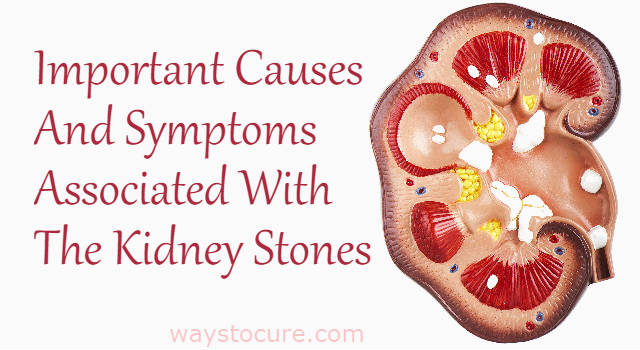Basically kidney stones are formed at the inner linings of the kidney due to the accumulation of various dissolved minerals. The composition of these kidney stones includes calcium oxalate and other compounds. The medical term of kidney stones is considered as Neprolithiasis. As per a statistic report, one in a twenty people faces the problems associated with the kidney stones. Mainly, the kidney stones maintain a sharp crystalline structure and grow up to the size of a golf ball. These stones mainly affect the urinary tract and causes intense pain at regular intervals. The pain associated with kidney stone is considered as renal pain and is highly unbearable.
- The main cause of kidney stones is shortage of water in a human body. The water mainly dilutes the uric acid, but when enough water is not available in the body, the acidic environment around the kidneys increases and leads to the formation of small kidney stones.
- Sometimes heredity also plays an important role in the formation of kidney stones. Mainly, the kidney stones are associated with high levels of calcium in the urine. High level of calcium in the urine is termed as hypercalciuria. This hypercalcuria is passes from one generation to another. Thus heredity can be a main reason for the cause of kidney stones.
- In most of the cases, the geographical conditions also manipulate the formation of kidney stones. The hot climate along with inappropriate drinking water makes the urine more concentrated. This allows the concentration of more chemicals around the kidney, thus the nidus is formed.
- When a human consumes more salt and animal proteins, the chance for the formation of kidney stones increases. Though diet regularly doesn’t involve with the formation of stones, but the risks are always maintained.
- Some people consume various water pills and calcium containing antacids. These items increase the level of calcium in the urine, which directly leads to the formation of stones in the kidney. Consumption of different medicines including indinavir, vitamin A and D, ciproflaxin, ceftriaxone, phenytoin also leads to the formation of the stones.
- Various diseases including Dent’s disease, medullary sponge kidney, hyperparathyroidism, renal tubular acidosis, urinary tract infections, Crohn’s disease also play an important role in the cause of kidney stones.
A patient with kidney stones suffers through a lot of pains. Apart from the pains, there are also other symptoms associated with the kidney stones, such as –
- If there is an infection associated with the kidney stone, then fever and chills are common.
- Drops of blood in the urine.
- High burning sensation at the time of urinating.
- High urge to urinate all the time.
- When the stone moves into the ureter, the amount of urine excreted is reduced.
- Visibility of white blood cells in urine.
- Nausea and vomiting
Thus, all these symptoms lead to the formation of stones in the kidneys. It is highly recommended to opt for immediate diagnosis and to consult a doctor.
